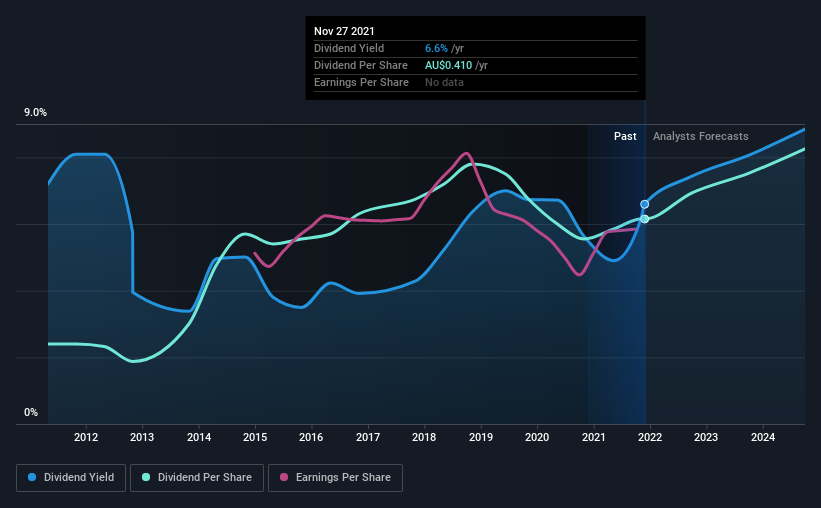Here's Why We're Wary Of Buying Pendal Group's (ASX:PDL) For Its Upcoming Dividend
Pendal Group Limited (ASX:PDL) stock is about to trade ex-dividend in four days. The ex-dividend date is one business day before the record date, which is the cut-off date for shareholders to be present on the company's books to be eligible for a dividend payment. The ex-dividend date is an important date to be aware of as any purchase of the stock made on or after this date might mean a late settlement that doesn't show on the record date. In other words, investors can purchase Pendal Group's shares before the 2nd of December in order to be eligible for the dividend, which will be paid on the 16th of December.
The company's next dividend payment will be AU$0.24 per share, on the back of last year when the company paid a total of AU$0.41 to shareholders. Based on the last year's worth of payments, Pendal Group has a trailing yield of 6.6% on the current stock price of A$6.22. If you buy this business for its dividend, you should have an idea of whether Pendal Group's dividend is reliable and sustainable. As a result, readers should always check whether Pendal Group has been able to grow its dividends, or if the dividend might be cut.
Check out our latest analysis for Pendal Group
If a company pays out more in dividends than it earned, then the dividend might become unsustainable - hardly an ideal situation. It paid out 79% of its earnings as dividends last year, which is not unreasonable, but limits reinvestment in the business and leaves the dividend vulnerable to a business downturn. We'd be worried about the risk of a drop in earnings.
When a company paid out less in dividends than it earned in profit, this generally suggests its dividend is affordable. The lower the % of its profit that it pays out, the greater the margin of safety for the dividend if the business enters a downturn.
Click here to see the company's payout ratio, plus analyst estimates of its future dividends.
Have Earnings And Dividends Been Growing?
Companies with falling earnings are riskier for dividend shareholders. If business enters a downturn and the dividend is cut, the company could see its value fall precipitously. That's why it's not ideal to see Pendal Group's earnings per share have been shrinking at 3.1% a year over the previous five years.
We'd also point out that Pendal Group issued a meaningful number of new shares in the past year. Trying to grow the dividend while issuing large amounts of new shares reminds us of the ancient Greek tale of Sisyphus - perpetually pushing a boulder uphill.
The main way most investors will assess a company's dividend prospects is by checking the historical rate of dividend growth. Pendal Group has delivered 9.9% dividend growth per year on average over the past 10 years. The only way to pay higher dividends when earnings are shrinking is either to pay out a larger percentage of profits, spend cash from the balance sheet, or borrow the money. Pendal Group is already paying out 79% of its profits, and with shrinking earnings we think it's unlikely that this dividend will grow quickly in the future.
The Bottom Line
From a dividend perspective, should investors buy or avoid Pendal Group? Earnings per share have been declining and the company is paying out more than half its profits to shareholders; not an enticing combination. All things considered, we're not optimistic about its dividend prospects, and would be inclined to leave it on the shelf for now.
Having said that, if you're looking at this stock without much concern for the dividend, you should still be familiar of the risks involved with Pendal Group. In terms of investment risks, we've identified 3 warning signs with Pendal Group and understanding them should be part of your investment process.
We wouldn't recommend just buying the first dividend stock you see, though. Here's a list of interesting dividend stocks with a greater than 2% yield and an upcoming dividend.
This article by Simply Wall St is general in nature. We provide commentary based on historical data and analyst forecasts only using an unbiased methodology and our articles are not intended to be financial advice. It does not constitute a recommendation to buy or sell any stock, and does not take account of your objectives, or your financial situation. We aim to bring you long-term focused analysis driven by fundamental data. Note that our analysis may not factor in the latest price-sensitive company announcements or qualitative material. Simply Wall St has no position in any stocks mentioned.
Have feedback on this article? Concerned about the content? Get in touch with us directly. Alternatively, email editorial-team (at) simplywallst.com.


